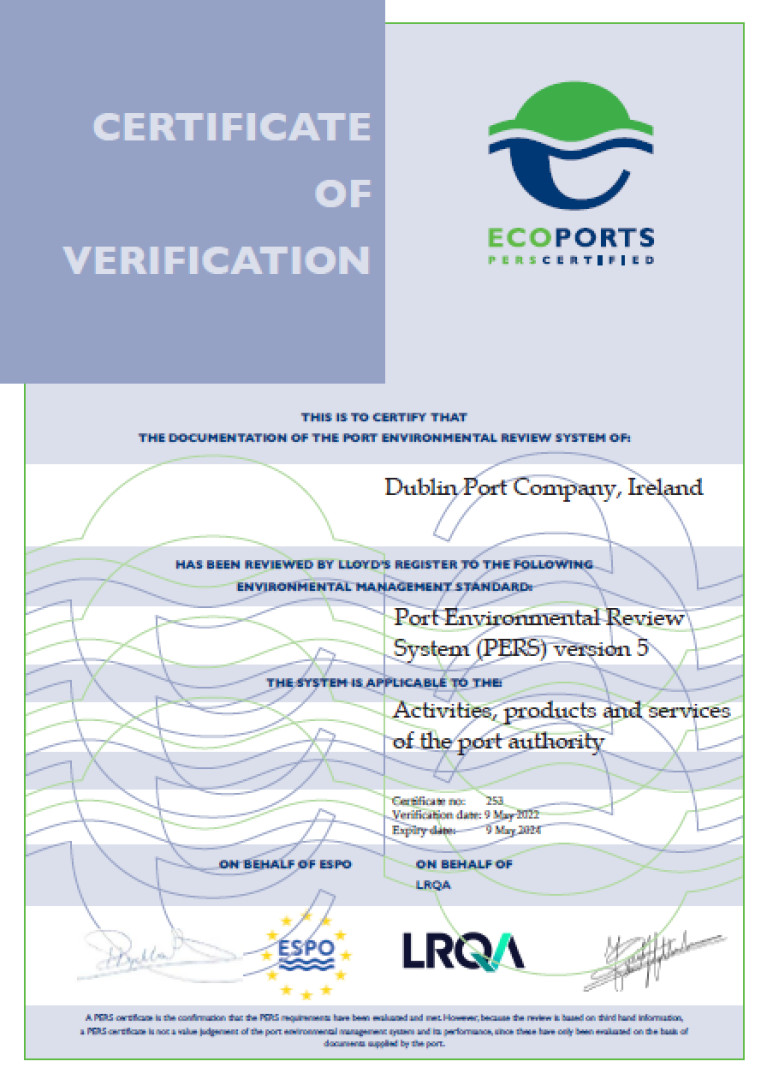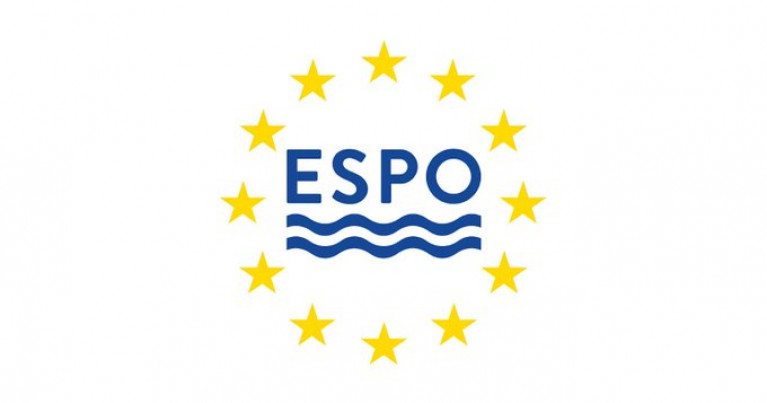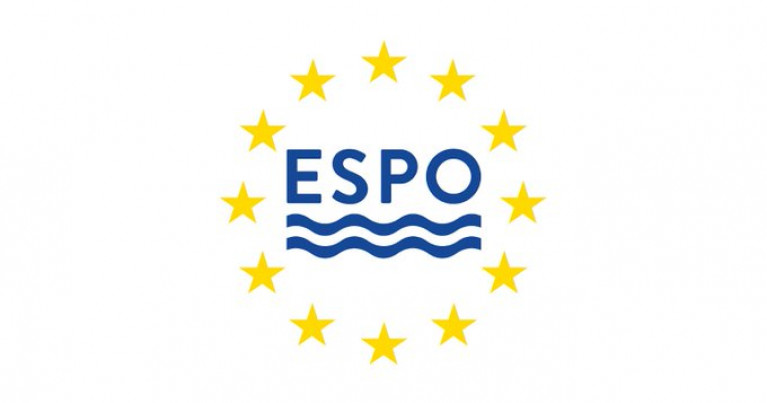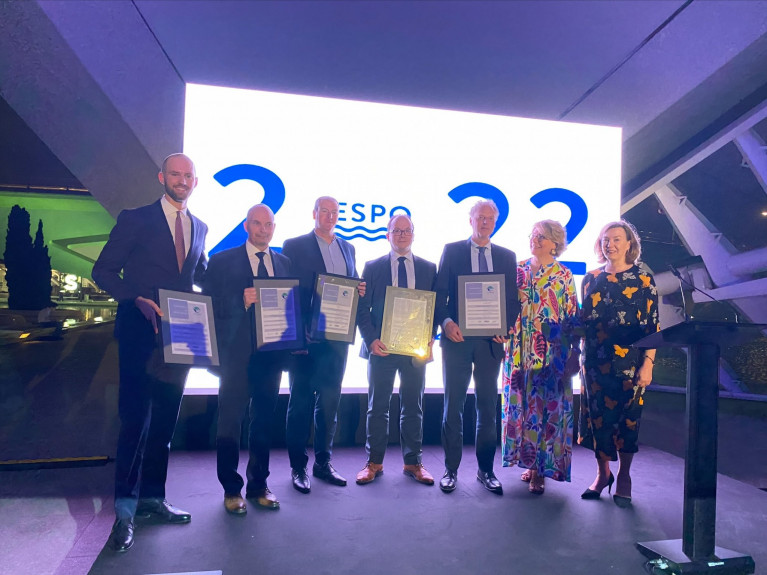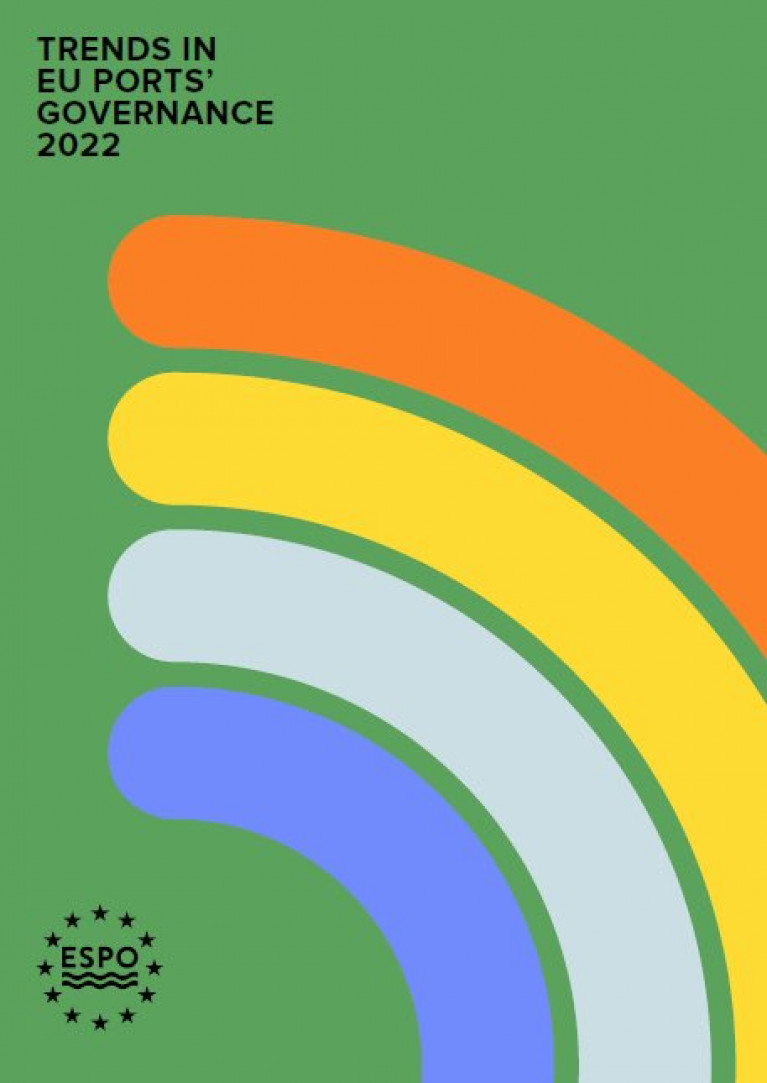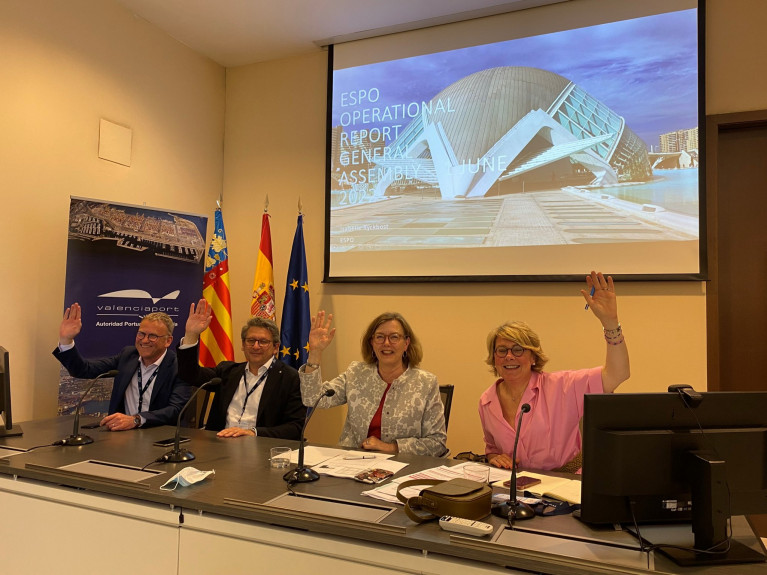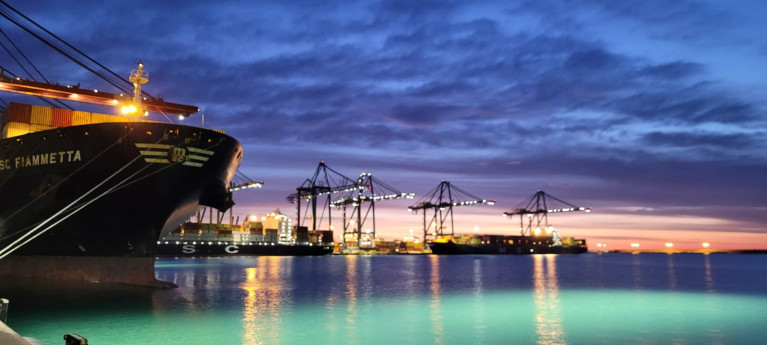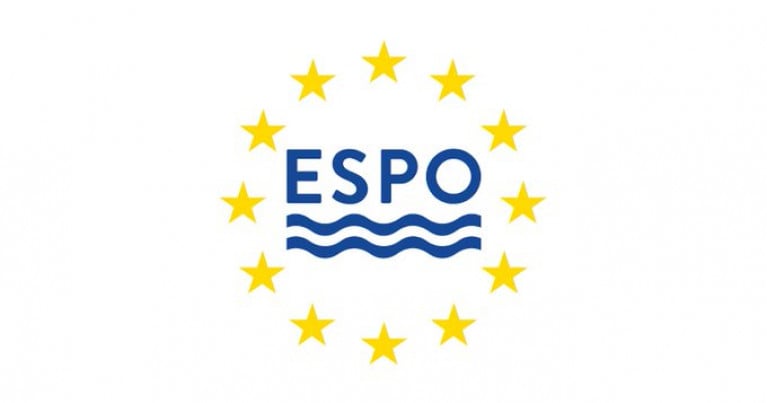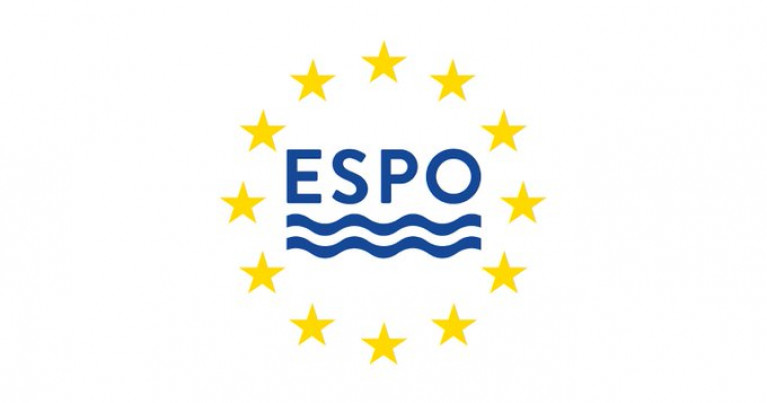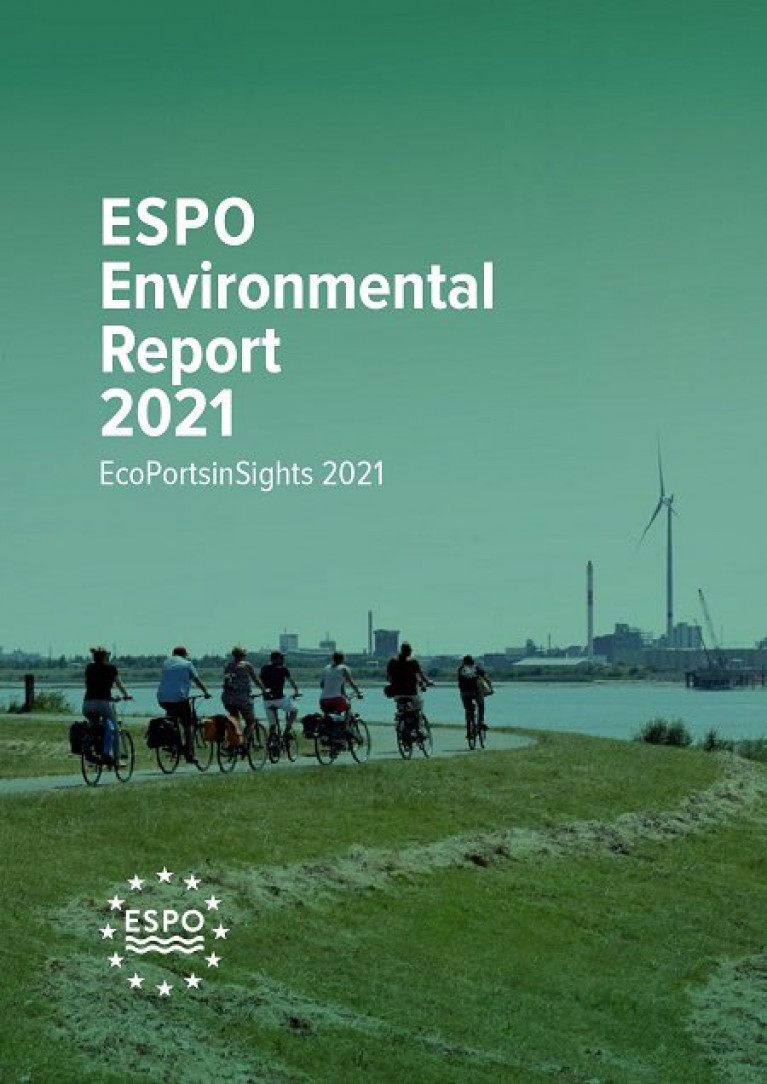Displaying items by tag: ESPO
Dublin Port Receives Sixth EcoPorts Environmental Management Standard (PERS) Certificate
Dublin Port has been congratulated by the European Sea Ports Organisation (ESPO), for being certified through the EcoPorts’ environmental management standard (PERS).
The Port of Dublin joined the EcoPorts’ network in 2008 and is PERS-certified for the sixth time.
Isabelle Ryckbost, ESPO Secretary General, commented: “The Port of Dublin is a textbook example of a fast-growing urban port that is embracing its nature, heritage and conservation. The findings of the Strategic Environmental Assessment (SEA), Environmental Report and Natura Impact Statements are integral part of the latest port Masterplan. It is very nice to see that ports like Dublin are continuously recertifying with PERS, making them long-term members of the Ecoports network”.
Valter Selén, ESPO Senior Policy Advisor and EcoPorts Coordinator, said: “We are very happy to see Dublin Port Company continues its incredible work on environmental management. Their sixth PERS-certification is evidence of continued self-improvement, and an inspiration to other major urban ports. We look forward to following the Port in its efforts to protect the environment and the wildlife around the port”.
PERS is the only port-specific environmental standard. The last five years have seen important increases in its recognition and membership, with 109 ports from 25 countries currently counting themselves as part of the EcoPorts Network, and 35 ports holding PERS certification. Compliance with the EcoPorts’ PERS standard is independently assessed by LRQA and the certificate has a validity of two years. EcoPorts’ PERS is revised after the 2-year period to make sure that the port continues to meet the requirements.
For additonal information on EcoPorts’ PERS, visit here inadditon to this website
Ports And Terminal Operators in Europe Call for OPS Where it Makes Sense in AFIR & FuelEU Maritime
The European Sea Ports Organisation (ESPO) and the Federation of European Private Port Companies and Terminals (FEPORT) have jointly agreed that the proposals for an Alternative Fuels Infrastructure Regulation (AFIR) and the FuelEU Maritime Regulation should enable the deployment of OPS where it makes the most sense.
The greening of shipping is a priority for European port stakeholders. This entails addressing emissions from shipping both during navigation and at berth. Onshore power supply (OPS), also known as shore-side electricity, is one of the technologies available to help reduce greenhouse gas emissions at berth.
Both organizations underline the need for an ambitious deployment of OPS as a means to reduce the harmful emissions of ships of nitrogen oxides, sulphur oxides and particulate matter. In this way, port stakeholders can contribute to the much-needed greening of shipping.
Article 9 of the Commission AFIR proposal could result in the entire port needing to have OPS if it receives more than a certain number of port calls by a container or passenger vessel. This would entail significant additional public investment for deploying OPS compared to a more focused approach. These investments are unlikely to be cost-efficient in relation to the emission reductions that they can deliver.
ESPO and FEPORT would instead propose an approach which focuses on OPS deployment per location (such as berths or terminals) in the port, rather than per port. This would ensure that OPS, also known as shore-side electricity, is deployed where it makes the most environmental and economic sense, whilst maintaining the established roles and responsibilities of the various port stakeholders[1].
To avoid a waste of limited time and public resources, the legal framework on the European level should ensure that OPS is deployed at locations in the port where each installation will deliver maximal emissions reductions per Euro invested.
To optimise the use of OPS as a solution to emissions at berth, ESPO and FEPORT therefore call for the following:
1. A requirement for ships to use OPS when it is available in ports in FuelEU Maritime
2. Prioritising OPS deployment in port locations where it reduces emissions the most in AFIR
This approach does not assign new responsibilities to stakeholders in the port, and would respect the diverse governance models of European ports.
By calculating the number of port calls based on the relevant locations in the port, it becomes possible for Member States and ports to prioritise investments in OPS where it makes the most sense in terms of environmental benefit (GHG reductions). Accordingly, locations in the port that are normally not called at, or that are not intended to be called at by the ship segments required to use OPS at berth, such as underused terminals, can be excluded from the requirement.
ESPO and FEPORT welcome that such an approach has been submitted by different members from different political groups and hopes that this approach will be well reflected in the compromise position that is being established by the rapporteur and shadow rapporteurs in the Transport Committee.
ESPO and FEPORT look forward to supporting policymakers in introducing a common-sense approach to OPS.
The European Sea Ports Organisation (ESPO) represents the port authorities, port associations and port administrations of the seaports of 22 Member States of the European Union and Norway at political level. ESPO has also observer members in Albania, Iceland, Israel, Montenegro, Ukraine and the United Kingdom. ESPO is the principal interface between the European seaport authorities and the European institutions. In addition to representing the interests of European ports, ESPO is a knowledge network which brings together professionals from the port sector and national port organisations. ESPO was created in 1993.
FEPORT represents the interests of 1225 private port companies and terminals performing cargo handling and logistics related activities in European seaports, which employ over 390.000 workers. The organisation was founded in 1993 to promote the interests of its members, and to maintain constant dialogue with all EU institutional and non-institutional stakeholders. FEPORT is based in Brussels, Belgium.
[1] As defined in Regulation (EU) 2017/352.
European Ports Welcome EP Adoption of Maritime ETS that Addresses Issue of Carbon & Business Leakage
The European Parliament on the 22 June adopted its position on the EU Emission Trading System (EU ETS), which includes an expansion of the ETS to include shipping emissions.
The European Sea Ports Organisation (ESPO) welcomes the EP position that outlines an ambitious and robust ETS that includes measures to address, and if possible, avoid carbon and business leakage. ESPO also welcomes that the EP position includes earmarking of revenues for investments in ports and maritime.
In order for a regional ETS in the EU to be effective and aligned with the polluter pays principle, carbon leakage through rerouting of ships outside of the ETS scope must be avoided at all costs. If this is not addressed in the final legislation, the ETS would fail to effectively reduce emissions from ships whilst also producing a negative impact on the European port business.
European ports therefore strongly support the measures adopted by European Parliament making it less attractive for ships to change their routes, divert calls, or engage in other evasive behaviours in order to avoid paying into the EU ETS.
ESPO believes that the EP position provides a good basis to address carbon and business leakage in the ETS. The preventative measures included in the EP position should be included in the final ETS to be agreed between European Parliament and EU Member States.
In addition ESPO therefore calls on EU Member States in the Council to closely consider the EP position and to address carbon and business leakage in their general approach to be agreed on 28 June.
"The EP position on EU ETS contains many of the key elements for an ambitious and effective maritime emission trading system. We very much welcome the willingness of the Parliament to address the risk of carbon and business leakage, which would undermine the climate goals whilst damaging the competitiveness of the EU port sector. We hope that EU Member States take these measures onboard in their general approach as part of finding a solution to this issue. Some further fine-tuning might be needed but all the necessary elements for a solution is now on the table.”, says Isabelle Ryckbost, ESPO Secretary General.
More work is needed to ensure that the maritime EU ETS delivers the greening of shipping, whilst safeguarding the competitiveness of the European maritime sector and ports.
European ports look forward to helping policymakers find solutions to the issue of carbon and business leakage to deliver an effective maritime ETS.
Port of Cork Among Five Ports Receiving PERS Certificate at European Sea Ports Organisation Conference
The European Sea Ports Organisation (ESPO) congratulates five ports among them Afloat highlights, the Port of Cork to receive their PERS certificate that took place at ESPO's Conference held in Valencia, Spain.
The other PERS ports congratulated is the Port of Harlingen (the Netherlands), the Port of Helsinki (Finland), the JadeWeserPort (Germany), and the Port of Rauma (Finland) for being certified through the EcoPorts’ environmental management standard (PERS).
Isabelle Ryckbost, ESPO Secretary General, Annaleena Mäkilä, ESPO Chair, and Valter Selén, EcoPorts Coordinator, handed over the PERS certificates to the ports’ representatives during the annual ESPO Conference held in the Mediterranean port city.
Isabelle Ryckbost, ESPO Secretary General, commented: “It is very recomforting to see that five ports have been certified over the last months. That brings the number of PERS-certified ports to 35. As demonstrated in our freshly published ESPO report on Trends in Governance, we see that ports are increasingly making efforts to be transparent, in particular on environmental performance towards their stakeholders and the wider port community. Congrats to all five PERS-certified ports”.
Valter Selén, ESPO Senior Policy Advisor and EcoPorts Coordinator, said: “I would like to congratulate all the PERS-certified ports on their achievement. Re-certification requires the port to show improved environmental management. The Port of Harlingen received its fifth PERS-certification, and has made sustainability a core part of its mission. The same is true for the Port of Cork, which has been a member of the EcoPorts Network since 2005. JadeWeserPort has been PERS-certified four times, and joined the Network in 2011. I would also like to congratulate the Port of Helsinki and the Port of Rauma on getting PERS-certified for the first time, strengthening the presence of EcoPorts in Scandinavia. We look forward to working with all five ports in their continued efforts to engage in good environmental management”.
PERS is the only port-specific environmental standard. The last five years have seen important increases in its recognition and membership, with 106 ports from 25 countries currently counting themselves as part of the EcoPorts Network, and 35 ports holding PERS certification.
Compliance with the EcoPorts’ PERS standard is independently assessed by Lloyd’s Register and the certificate has a validity of two years. EcoPorts’ PERS is revised after the 2-year period to make sure that the port continues to meet the requirements.
For more information on EcoPorts’ PERS, visit the EcoPorts website.
On the first day of the European Sea Ports Organisation conference held in Valencia, Spain, the organisation today released their “Trends in EU Ports’ Governance 2022” report.
Both the public role and commercial expectations are on the rise for European port managing bodies which is one of the key messages of the ESPO report.
The 2022 edition clearly demonstrates how Europe’s seaports nowadays cover a wider scope of activities and responsibilities than before. While there has been a clear move towards corporatisation for many years, the strategic role and public responsibilities have come to the forefront again: European ports were instrumental in guaranteeing supply of essential goods during the COVID-19 pandemic, Europe’s ports are an important element to ensure the resilience and security of energy supply following the Russian invasion of Ukraine and they are central to Europe’s long-term energy transition.
In addition, the role of European port managing bodies has become more active in a more extensive port ecosystem. Beyond their traditional landlord function, many port managing bodies are active initiators, facilitators or even co-investors in areas such as digitalisation, circular economy and energy.
The 2022 report also highlights the trend of cooperation, either between ports, or with other stakeholders in the port ecosystem and beyond. The degree of cooperation varies from creating coalitions of the willing on a specific issue to full mergers.
Every five years, ESPO carries out an extensive Port Governance Fact Finding Survey.
More than 70 port managing bodies covering 20 Member States participated in the survey which forms the basis of the “Trends in Ports’ Governance 2022” report.
European Sea Ports Organisation Adopts 'Valencia Declaration' on Empowering Europe’s Ports
In advance of European Sea Ports Organisation (ESPO) conference in Spain, its members met in Valencia for its General assembly yesterday (1st June), where they have agreed on the following Declaration:
Europe’s seaports played a strategic and essential role throughout recent crises. Ports are key partners for Europe’s future sustainability and resilience and are more than ever needed. To step up this role and give full recognition to their crucial contribution to the decarbonisation and repowering of Europe, ESPO calls on governments at all levels to empower the European port ecosystem.
This implies full recognition of the strategic and essential role of ports. This further means both the financial and non-financial support required to make ports robust and resilient in pursuing their strategies and pathways in decarbonising and repowering Europe. Relentless and pressing investments in safeguarding and further enhancing critical port infrastructure and optimising the maritime and hinterland connectivity of ports are needed to allow ports to continue to be essential nodes in the supply chain, ensuring the mobility of people and strategic players in the new energy landscape.
Over the last two years, the strategic and essential role of Europe’s ports has come to the forefront.
During the COVID-19 crisis, Europe’s ports maintained the continuity of operations and ensured the security of supply. Europe’s ports activated contingency plans, which resulted in ports remaining fully operational during this crisis. More than ever, European ports demonstrated their essential and critical role in facilitating the supply of necessary goods and materials.
In the current geopolitical crisis caused by the Russian invasion in Ukraine in February 2022, Europe’s ports are again playing a crucial role in keeping supply chains operational and in setting up new alternative routes, including humanitarian lanes and solidarity lanes for Ukrainian exports. In addition, European ports are pivotal safeguarding the energy supply and in reducing the energy dependency from Russia. Ports in Europe will be instrumental in repowering Europe in the short term, by enhancing the setting up of alternative routes for the provision of gas and increasing gas storage. At the same time, ports will be key in stepping up the efforts to prepare for a fossil-free energy landscape in Europe.
In order for ports to play this strategic and essential role both in the recovery, the decarbonisation and the repowering of Europe, ESPO believes that ports must be empowered in four ways:
1. The strategic and essential role of ports and its managing bodies should be fully recognised by the European institutions, national, regional and local governments. Ports and their infrastructure should be considered as strategic assets.
2. Ports should be prioritised in the EU’s and national investment plans. In an overall difficult economic context, characterised by higher interest rates, inflation, steep increases in energy prices and disrupted markets of raw materials, financial priorities will have to be made. Ports should be considered in that context.
3. Ports play specific roles and have different profiles. Therefore, port managing bodies should be able to identify and boost, together with their stakeholders, the investments that add most value and deliver best in achieving the EU’s decarbonisation and repowering Europe goals in their individual contexts. Ports should be given the tools and should be supported in developing the best business case and the best economic case to fulfil their mission and avoid stranded assets.
4. Ports in Europe must be able to count on a legislative framework and investment climate that enables them to plan for the long-term while remaining agile and flexible to be able to quickly respond to rapidly changing economic, geopolitical and environmental realities. Authorisation procedures and funding processes, as well as other administrative procedures should be accelerated and applied in coherence with the EU’s overarching goals and should not unnecessarily delay the realisation of projects.
European Sea Port Organisation Annual Conference: Valencia, Spain (2 – 3 June) Registration Now Open!
As Afloat reported last month, the European Sea Ports Organisation (ESPO) is to host their 18th edition of its Annual Conference in Valencia, Spain (2-3 June) and those intending to attend can now register.
The theme of this year’s Conference, hosted by the Port of Valencia, is “Empowering Europe’s ports”. If you want to be part of this annual highlight of and for the European port industry, check out the programme at www.espo-conference.com, clear your agenda for these days and to register here.
Europe’s ports are no longer operating in a societal, commercial, and geopolitical safe and stable environment as we have known during the last decades. The global health crisis we went through over the last two years and the war in Ukraine we are experiencing at the moment require ports to be agile and resilient at all times.
At the same time, challenged by the upcoming multipolar world, Europe is trying to achieve strategic autonomy, thereby safeguarding a stable trade and economic environment and ensuring the security of supply of critical raw materials and goods. With realities changing overnight, it becomes increasingly difficult to make long-term investment plans and strategies. This disruptive societal, commercial, and geopolitical environment comes also at a time where ports are setting course to realise Europe’s ambition and prepare for a carbon-neutral and digitally smart future.
How can ports prepare today for the world of tomorrow? Which role are Europe’s ports to play in the supply chains of tomorrow? How will the trade patterns evolve? How will the new energy landscape impact port infrastructure and spatial planning? Is the current energy crisis a catalyst of the green transition or a game stopper? In short, how to empower Europe’s ports and how can ports empower Europe’s economy and society?
These are some of the questions to be addressed at the forthcoming ESPO Conference. As usual, the Conference will feature a series of top speakers and experts, but will also offer an excellent platform for discussions and exchanges between port professionals, port stakeholders, academics, and EU policy makers.
After more than two years, there is a strong need to catch up among port professionals and friends. A breakout session at the end of day one, as well as the usual conference dinner on 2 June will offer excellent opportunities for networking.
The ESPO Conference as well as the conference dinner will take place in the heart of the unique Ciutat de les Arts i les Ciències. All practical details are available at www.espo-conference.com
Reasons enough to book now for this annual highlight of the European port industry! Valencia is waiting for you!
Do not come alone! We have a special “family rate” for those coming with three or more from the same port, organisation or company.
For the second year in a row, the overall number of women participating in the European Sea Ports Organisation (ESPO) Committees meetings has increased.
In 2021, taking all technical committees together, women represented 38,87% of the port professionals who attended ESPO meetings. This represents a 3% increase compared to the numbers in 2020. Ever since ESPO started monitoring the gender balance of its internal meetings in 2018, that number has been steadily increasing.
A closer look into the results of the different technical committees reveals that a majority of ESPO committees have seen an increase in the share of women attending the meetings in 2021. The Blue Growth Network reports the best result with 64,71% of women attending its meetings, an increase of 6% compared to 2020. The Sustainable Development Committee and the Cruise and Ferry Port Network both had an almost equal representation of men and women at their meetings, a stable trend in both committees compared to 2020. Even if we see a slight decrease compared to the previous year, 4 participants out of 10 in the Port Governance and Management Committee in 2021 were women.
Two Committees showcase the biggest increase, with 12% more women taking part in the meetings of the Intermodal, Logistics & Industry Committee and the Economic Analysis and Statistics Committee (in total 36% and 37%, respectively). The Energy Network, the General Assembly, and the Executive Committee, gathered on average one third of women at their meetings (34%, 33% and 31%, respectively). The Trade Facilitation, Customs and Security, and Marine Affairs Committees show the lowest percentage of women attendees last year with 19%.
“It is very encouraging to see that also in a challenging year where many port professionals had to work from home, combining more than ever work with family, the female attendance to ESPO meetings has grown. Referring to this year’s theme for the International Women’s Day, I invite every port in Europe to break the bias that still might exist for recruiting women for certain functions in the port. Job offers and profiles for jobs in the port must attract women to the port and not discourage them,” says ESPO’s Chair Annaleena Mäkilä.
Since 2018, ESPO has been monitoring the gender balance through the effective attendance of port professionals to the different meetings of the organisation. The results of this monitoring are published each year on the occasion of the International Women’s Day. ESPO is also one of the founding members of the European Commission’s initiative “Women in Transport – EU Platform for change”, launched in 2017.
ESPO asks for Ambitious & Coherent Legislation on Provision and Use of Clean Energy Infrastructure for Shipping
Europe’s ports welcome that the review of the current AFIR proposal is accompanied by provisions in the new FuelEU Maritime Proposal, which requires vessels to use shore-side electricity infrastructure at berth.
The alignment of requirements between what ports need to do and the obligations for shipping lines to use the infrastructure is one of the main points of European Sea Ports Organisation (ESPO)’s joint position on the maritime pillar of the proposal for an Alternative Fuel Infrastructure Regulation (AFIR) and on the proposal for a FuelEU Maritime Regulation.
Europe’s ports ask for a full alignment of Article 9 of the AFIR proposal with Articles 4 and 5, as well as with Annex III of the FuelEU Maritime proposal.
“For years we have been discussing the chicken and the egg problem as a barrier to making real progress in greening of shipping. Let’s now work together with all policy makers and stakeholders to move forward towards investing in technologies that are effectively being used and that lead to effectively reducing the emissions of shipping, both at berth and during navigation. Even if different working parties in the Council and key players in the European Parliament are working on each file, it is essential that these two pivotal Fit for 55 proposals are being discussed together all along the legislative process. We look forward to working with the Parliament and the Council to deliver a coherent package,” says Isabelle Ryckbost, ESPO’s Secretary General.
For Europe’s ports, shore side electricity (SSE) is an important instrument to reduce emissions of shipping at berth, but it has to be deployed where it makes most sense in terms of delivering cost-effective reductions of greenhouse gases at berth. Prioritisation is essential in that respect. For ESPO, it would be more effective to define the scope based on a minimum level of traffic volume per terminal (instead of per port) to prioritise busy terminals and avoid underused capacity being installed. The focus on certain segments of shipping should however not be seen as an exemption for the other segments of shipping from the requirement to lower emissions at berth.
ESPO regrets that the AFIR proposal only addresses the shore side electricity installation in the port, thereby overlooking the issues of grid connectivity, grid capacity and grid conversion. These should also be tackled in the proposals as they are essential to make installed SSE operational. Installing grid converters, connecting to and upgrading the grid can be required to ensure the supply of shore-side electrical power to certain vessels. Such installations and upgrades are often outside the remit of the port authority/port managing body.
In addition, ESPO calls for a consultation mechanism to aid in the application of the requirements of the AFIR and FuelEU Maritime. To allow ports to optimise their investments as much as possible and ensure that they function well, individual ports need to be able to plan ahead. Ports need to know if a shipping operator intends to use onshore power supply or rather one of the other alternative technologies foreseen in the Annex III of the proposal. Moreover, ports should know what power needs vessels will have when at berth, in order to plan for sufficient SSE capacity during a given call.
“We welcome the proposals to increase the use and availability of alternative fuels in the maritime sector. The setting of requirements for certain ship segments to use shore side electricity at berth is crucial to matching the available supply with demand. But within this legislative framework, it will be important for stakeholders to work together. Ports face huge investments and must be able to optimise these investments, where it makes most sense. Shipping operators can help by clearly indicating their intentions and needs to the port and/or the responsible investing body, thereby avoiding stranded assets in the port,” adds Isabelle Ryckbost.
Whilst ESPO recognises the transitional role of LNG, a top-down obligation to install LNG is no longer fit for purpose. ESPO finds that given its transitional role, the provision of LNG bunkering infrastructure in ports should in essence be demand driven, in particular as regards new investments.
To be fit for 55, there is a need to fund for 55% emission reductions. An ambitious SSE deployment plan in ports requires adequate funding, since every shore side electricity facility installed so far has been supported by 50% or more public financing. Next to the existing EU funding mechanisms such as the Connecting Europe Facility (CEF), ESPO calls for revenues from the maritime EU Emission Trading System (EU ETS) and the penalties levied under the FuelEU Maritime to be used to promote the distribution and use of renewable and low-carbon fuels and technologies in the maritime sector. On top of that, ESPO asks for an EU-wide permanent tax exemption for the electricity provided to ships at berth in the reviewed Energy Taxation Directive.
ESPO and its members look forward to further discussing these proposals with EU decision-makers.
A first exchange of view on the AFIR and FuelEU proposals in the European Parliament TRAN committee is scheduled on 1 December.
ESPO’s position on AFIR and FuelEU Maritime can be found here.
European Sea Ports Organisation Presents its Environmental Report | EcoPortsinSights 2021
The European Sea Ports Organisation (ESPO) is proud to present the annual ESPO Environmental Report for 2021.
The ESPO Environmental Report is part of EcoPorts, the environmental flagship initiative of the European Sea Ports Organisation (ESPO). This 6th edition is based on data from 99 European ports from 21 European countries, who filled in the EcoPorts Self-Diagnosis Method (SDM) (www.ecoports.com). The SDM is a checklist of good practice and provides the database for this report.
With climate change and environmental issues on top of both the ports and the policy makers’ agendas, the 2021 Report has become an essential tool to monitor performance and see where problems arise. It provides ESPO and European policymakers with insights on the environmental issues that European ports are working on, and informs the priorities of ESPO.
For 2021, the report shows a number of positive trends amongst key indicators. Based on the slightly larger sample compared to in 2020, the Top 10 environmental priorities of European ports are almost the same. The five top priorities are the same as in 2020, with air quality, climate change, and energy efficiency as the top three priorities.
The 2021 Report also finds that ports are demonstrably improving their environmental management, addressing their priorities through bottom-up initiatives. In 2021, a growing number of ports provided environmental training programs and training, and close to 40% of ports are certified with EcoPorts PERS, which is the only port-specific certification on the market.
Together with the ESPO Green Guide 2021 (available here), the ESPO Environmental Report strengthens the long-standing efforts of European ports to monitor and address high priority environmental issues.
“The positive trends in the 2021 Report are encouraging for Europe’s ports, and in particular, port professionals working in the field of environmental management, and very motivating for all those engaged in the work of EcoPorts. The environmental challenges economy and society are facing nowadays demand an exceptional engagement and involvement of all stakeholders in the port ecosystem. More than ever, monitoring, transparency and certification are essential elements to make progress on the greening path. Platforms such as EcoPorts are instrumental to exchange good practices and create coalitions of the willing. This report is a milestone, and I hope we can continue the same trend next year,” says Isabelle Ryckbost, ESPO Secretary General.
“We are very pleased with the findings of the 6th ESPO Environmental Report. The 2021 Report demonstrates that ports are taking the challenges they face seriously, and are taking action through environmental management. Improvements in the Environmental Management Index, and the growing number of PERS-certified ports show that the EcoPorts Network is more relevant and valuable to ports than ever before. The 2021 Report highlights strengths to build on, and issues to address in the years to come. Together with the ESPO Green Guide 2021, the 2021 Environmental Report provides ports with essential tools to further engage in greening from the bottom up,” says Valter Selén, EcoPorts Coordinator.
The full report is available through this link.



























